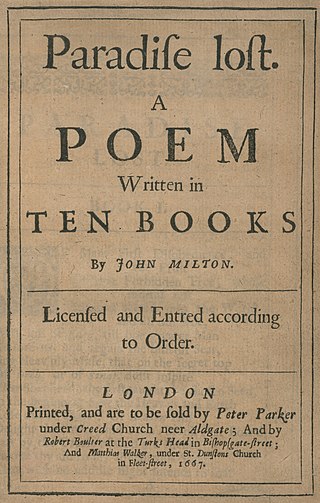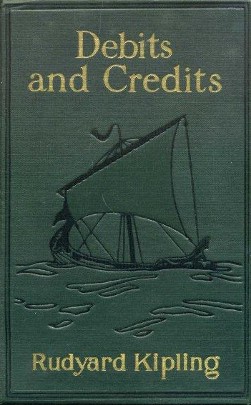
Lilith, also spelt Lilit, Lilitu, or Lilis, is a female figure in Mesopotamian and Jewish mythology, theorized to be the first wife of Adam and supposedly the primordial she-demon. Lilith is cited as having been "banished" from the Garden of Eden for not complying with and obeying Adam.

Paradise Lost is an epic poem in blank verse by the 17th-century English poet John Milton (1608–1674). The first version, published in 1667, consists of ten books with over ten thousand lines of verse. A second edition followed in 1674, arranged into twelve books with minor revisions throughout. It is considered to be Milton's masterpiece, and it helped solidify his reputation as one of the greatest English poets of all time. The poem concerns the biblical story of the fall of man: the temptation of Adam and Eve by the fallen angel Satan and their expulsion from the Garden of Eden.

In Jewish mythology, forbidden fruit is a name given to the fruit growing in the Garden of Eden which God commands mankind not to eat. In the biblical story, Adam and Eve eat the fruit from the tree of the knowledge of good and evil and are exiled from Eden:
And the Lord God commanded the man, saying, Of every tree of the garden thou mayest freely eat:
But of the tree of the knowledge of good and evil, thou shalt not eat of it: for in the day that thou eatest thereof thou shalt surely die.

The Eve of St. Agnes is a Romantic narrative poem of 42 Spenserian stanzas set in the Middle Ages. It was written by John Keats in 1819 and published in 1820. The poem was considered by many of Keats's contemporaries and the succeeding Victorians to be one of his finest and was influential in 19th-century literature.

Adam is the name given in Genesis 1-5 to the first human. Adam is the first human-being aware of God, and features as such in various belief systems.

Julia Caroline Ripley Dorr was an American author who published both prose and poetry. Although she wrote a number of novels and works on travel, she was best known for her poetry. Her work was conservative; she did not write anything that she felt was improper for children to hear, and was described as consisting of "respectable but not highly distinguished or passionate phrases to the conventional wisdom of her time and place". She had a keen sense of form and, working as she did in several mediums, to her belonged the distinction of never attempting to say in verse what might better find expression in prose. To her sense of form she added a clear-seeing eye, and the ability so to fit words together as to make others see what she saw.

Eve is a figure in the Book of Genesis in the Hebrew Bible. According to the origin story of the Abrahamic religions, she was the first woman. Eve is known also as Adam's wife.

Rose Hartwick Thorpe was an American poet and writer, remembered largely for the narrative poem, Curfew Must Not Ring Tonight (1867), which gained national popularity. It was translated into nearly every language of the world and was universally recognized as a veritable classic. Other poems followed, among them being "The Station Agent's Story," "Red Cross," and "In a Mining Town." Although a busy and prolific author, she was ill for some years. In 1888, she and her family removed to San Diego, California, living in Rosemere, Pacific Beach. Thorpe gave San Diego's "False Bay" the new moniker "Mission Bay" in a poem published in 1888 in The Golden Era; the name persists today.

"Eve's Diary" is a comic short story by Mark Twain. It was first published in the 1905 Christmas issue of the magazine Harper's Bazaar, in book format as one contribution to a volume entitled "Their Husband's Wives" and then in June 1906 as a standalone book by Harper and Brothers publishing house.

Adam and Eve, according to the creation myth of the Abrahamic religions, were the first man and woman. They are central to the belief that humanity is in essence a single family, with everyone descended from a single pair of original ancestors. They also provide the basis for the doctrines of the fall of man and original sin, which are important beliefs in Christianity, although not held in Judaism or Islam.

Nora Perry was an American poet, newspaper correspondent, and writer of juvenile stories, and for some years, Boston correspondent of the Chicago Tribune. Her verse was collected in After the Ball (1875), Her Lover's Friend (1879), New Songs and Ballads (1886), Legends and Lyrics (1890). Her fiction, chiefly juvenile, included The Tragedy of the Unexpected (1880), stories; For a Woman (1885), a novel; A Book of Love Stories (1881); A Flock of Girls and their Friends (1887); The New Year's Call (1903); and many other volumes.

Debits and Credits is a 1926 collection of fourteen stories, nineteen poems, and two scenes from a play by Rudyard Kipling, an English writer who wrote extensively about British colonialism in India and Burma. Four of the poems that accompany the stories are whimsically presented as translations from the "Bk. V of Odes" by Horace, but are actually poems by Kipling imitating the style of the Roman poet.
Lilith is the first opera by American composer Deborah Drattell, with a libretto by David Steven Cohen. It was premiered in 2001 at the New York City Opera and was directed by Anne Bogart.

Lilith, a biblical character suggested to be Adam's first wife and a significant female figure from Jewish mythology, has been developed over time into distinct characters in popular culture. One writer on witches, Judika Illes, wrote, "No spirit exerts more fascination over media and popular culture than Lilith. Her appearances are genuinely too numerous to count." Lilith is one of several figures with biblical or related origins integrated into popular culture who have been titled demon.

"A Cradle Song" is a poem written by William Blake in 1789, as part of his book Songs of Innocence.

Ella Dietz was an American actress and author. Professionally known by her maiden name, Ella Dietz, she was a writer of poems and songs, an instructor in elocution and dramatic art, a reader, and a reciter for charitable events. In the United States, she served as the fifth president of Sorosis, vice-president of the National Council of Women, and was a leading member of the Advisory Board of The Federation of Clubs. To the British public, she was well-known for her histrionic abilities, having acted leading roles in over thirty plays in London during the period of 1874 to 1881. She was also skilled as an artist with pencil and brush.

Ada Langworthy Collier was an American author from Iowa. She wrote sketches, short stories, poems, and several novels. Collier is remembered for Lilith, The Legend of the First Woman (1885).

Lilith is an 1887 painting by English artist John Collier, who worked in the style of the Pre-Raphaelite Brotherhood. The painting of the Jewish mythic figure Lilith is held in the Atkinson Art Gallery in Southport, England. It was transferred from Bootle Art Gallery in the 1970s.

Clara Doty Bates was a 19th-century American author who published a number of volumes of poetry and juvenile literature. Many of these works were illustrated, the designs being furnished by her sister. Her work was published in St. Nicholas Magazine, The Youth's Companion, Golden Days for Boys and Girls, Wide Awake, Godey's Lady's Book, and Peterson's Magazine. During the World's Columbian Exposition, she had charge of the Children's Building. Bates died in 1895.

Revelations of the Dark Mother, subtitled Seeds from the Twilight Garden, is an epic poem written by Phil Brucato and Rachelle Udell, illustrated by Rebecca Guay, Vince Locke, and Eric Hotz, and published by White Wolf Publishing in November 1998. Based on the tabletop role-playing game Vampire: The Masquerade and the World of Darkness series, the poem centers around Lilith and is her counterpoint to 1993's The Book of Nod, a poem focused on Caine, the first murderer. It is written in the same style as The Book of Nod, with heavy use of illustrations, and with a "vampire scholar" framing.

















